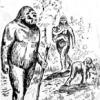Technically, a scientist is anyone who applies the scientific method when investigating a hypothesis.
There were scientists long before there were scientific organizations, degrees, and scientific awards.
Is an amateur astronomer who discovers an asteroid barreling toward Earth any less an astronomer than someone with a PhD in the science? The amateur is probably using a better telescope than Galileo had.
On the other hand, is Bill Nye, the "Science Guy", really a climate scientist? After all, he only has a bachelor's degree in mechanical engineering.
The real question is: "What does society currently accept as reasonable qualifications for a "Scientist"? And the answer may vary from field to field, subject to subject, and political viewpoint to political viewpoint.
Unfortunately; advanced degrees, experience, and resources are accompanied by a healthy portion of hubris.



